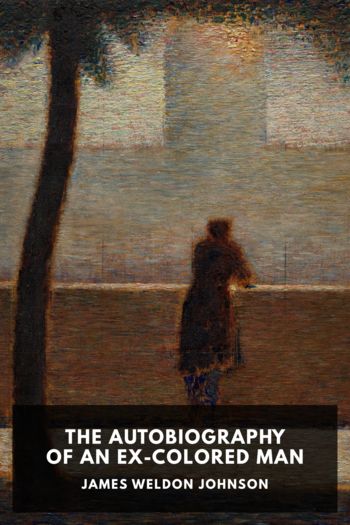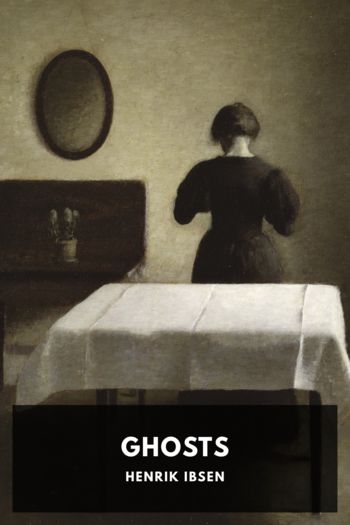Poetry - James Weldon Johnson (moboreader .TXT) 📗

- Author: James Weldon Johnson
Book online «Poetry - James Weldon Johnson (moboreader .TXT) 📗». Author James Weldon Johnson
In form of youth and mood of mirth,
Unnumbered centuries are hers,
The infant planets saw her birth;
The child of throbbing Life is she,
Twin sister to the greedy earth.
And back behind those smiling lips,
And down within those laughing eyes,
And underneath the soft caress
Of hand and voice and purring sighs,
The shadow of the panther lurks,
The spirit of the vampire lies.
For I have seen the great white witch,
And she has led me to her lair,
And I have kissed her red, red lips
And cruel face so white and fair;
Around me she has twined her arms,
And bound me with her yellow hair.
I felt those red lips burn and sear
My body like a living coal;
Obeyed the power of those eyes
As the needle trembles to the pole;
And did not care although I felt
The strength go ebbing from my soul.
Oh! she has seen your strong young limbs,
And heard your laughter loud and gay,
And in your voices she has caught
The echo of a far-off day,
When man was closer to the earth;
And she has marked you for her prey.
She feels the old Antaean strength
In you, the great dynamic beat
Of primal passions, and she sees
In you the last besieged retreat
Of love relentless, lusty, fierce,
Love pain-ecstatic, cruel-sweet.
O, brothers mine, take care! Take care!
The great white witch rides out to-night.
O, younger brothers mine, beware!
Look not upon her beauty bright;
For in her glance there is a snare,
And in her smile there is a blight.
Eternities before the first-born day,
Or ere the first sun fledged his wings of flame,
Calm Night, the everlasting and the same,
A brooding mother over chaos lay.
And whirling suns shall blaze and then decay,
Shall run their fiery courses and then claim
The haven of the darkness whence they came;
Back to Nirvanic peace shall grope their way.
So when my feeble sun of life burns out,
And sounded is the hour for my long sleep,
I shall, full weary of the feverish light,
Welcome the darkness without fear or doubt,
And heavy-lidded, I shall softly creep
Into the quiet bosom of the Night.
Mother, shed no mournful tears,
But gird me on my sword;
And give no utterance to thy fears,
But bless me with thy word.
The lines are drawn! The fight is on!
A cause is to be won!
Mother, look not so white and wan;
Give Godspeed to thy son.
Now let thine eyes my way pursue
Where’er my footsteps fare;
And when they lead beyond thy view,
Send after me a prayer.
But pray not to defend from harm,
Nor danger to dispel;
Pray, rather, that with steadfast arm
I fight the battle well.
Pray, mother of mine, that I always keep
My heart and purpose strong,
My sword unsullied and ready to leap
Unsheathed against the wrong.
The glory of the day was in her face,
The beauty of the night was in her eyes.
And over all her loveliness, the grace
Of Morning blushing in the early skies.
And in her voice, the calling of the dove;
Like music of a sweet, melodious part.
And in her smile, the breaking light of love;
And all the gentle virtues in her heart.
And now the glorious day, the beauteous night,
The birds that signal to their mates at dawn,
To my dull ears, to my tear-blinded sight
Are one with all the dead, since she is gone.
(From the Spanish of Plácido)
Enough of love! Let break its every hold!
Ended my youthful folly! for I know
That, like the dazzling, glister-shedding snow,
Celia, thou art beautiful, but cold.
I do not find in thee that warmth which glows,
Which, all these dreary days, my heart has sought,
That warmth without which love is lifeless, naught
More than a painted fruit, a waxen rose.
Such love as thine, scarce can it bear love’s name,
Deaf to the pleading notes of his sweet lyre,
A frank, impulsive heart I wish to claim,
A heart that blindly follows its desire.
I wish to embrace a woman full of flame,
I want to kiss a woman made of fire.
(Written in the Chapel of the Hospital de Santa Cristina on the Night Before His Execution)
If the unfortunate fate engulfing me,
The ending of my history of grief,
The closing of my span of years so brief,
Mother, should wake a single pang in thee,
Weep not. No saddening thought to me devote;
I calmly go to a death that is glory-filled,
My lyre before it is forever stilled
Breathes out to thee its last and dying note.
A note scarce more than a burden-easing sigh,
Tender and sacred, innocent, sincere—
Spontaneous and instinctive as the cry
I gave at birth—And now the hour is here—
O God, thy mantle of mercy o’er my sins!
Mother, farewell! The pilgrimage begins.
Twenty years go by on noiseless feet,
He returns, and once again they meet,
She exclaims, “Good heavens! and is that he?”
He mutters, “My God! and that is she!”
Three students once tarried over the Rhine,
And into Frau Wirthin’s turned to dine.
“Say, hostess, have you good beer and wine?
And where is that pretty daughter of thine?”
“My beer and wine is fresh and clear.
My daughter lies on her funeral bier.”
They softly tipped into the room;
She lay there in the silent gloom.
The first the white cloth gently raised,
And tearfully upon her gazed.
“If thou wert alive, O, lovely maid,
My heart at thy feet would to-day be laid!”
The second covered her face again,
And turned away with grief and pain.
“Ah, thou upon thy snow-white bier!
And I have loved thee so many a year.”
The third drew back again the veil,
And kissed the lips so cold and pale.
“I’ve loved thee always, I love thee to-day,
And will love thee, yes, forever and aye!”
I knew not who had wrought with skill so fine
What I beheld; nor by what laws of art
He had created life and love and heart
On canvas, from mere color, curve and line.
Silent I stood and made no move or sign;
Not with the crowd, but





Comments (0)